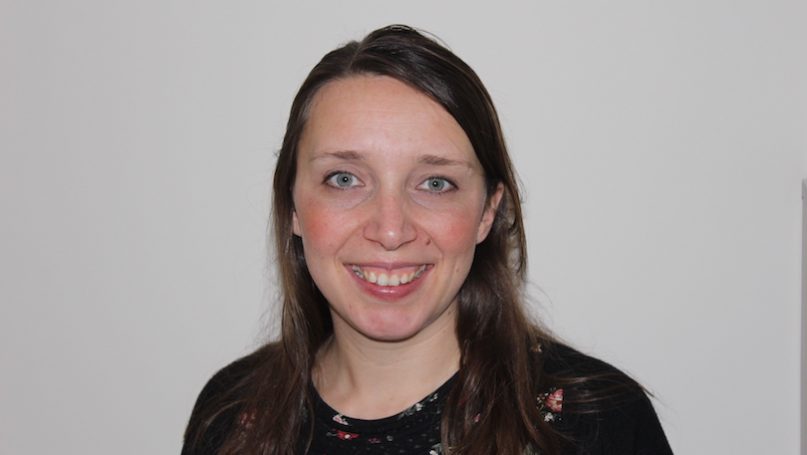
This feature is part of a series of interviews with the contributing authors of Foundations of International Relations.
Rosie Walters is a Lecturer in International Relations at Cardiff University, and a member of the editorial board of E-International Relations. She is co-author of ‘Critical Theories’ and author of ‘Gender and Sexuality’ in McGlinchey, Stephen (2022). Foundations of International Relations. Bloomsbury: London.
Your chapters in Foundations of International Relations deal with International Relations Theory – more particularly, those in the ‘critical’ category – and Gender and Sexuality. how did you first get involved in thinking about these particular areas?
I can’t really remember a particular moment, I’ve just always been interested in women’s rights and taken part in feminist campaigns and organisations. I think once you start to pay attention to the way in which gender impacts on our life experiences, it’s hard not to see it everywhere. At a certain point, I decided I really wanted to understand that on a deeper level, and that was when I decided to do my Masters in Gender and International Relations.
In terms of your journey from one-time student to academic, how did you find your way, and can you give a brief summary of your career thus far?
My undergraduate degree was actually in languages – French and Italian to be specific. I used the opportunity to travel and get some work experience with various NGOs, and after graduating I got a job with the British Red Cross. Amongst other things, I used to deliver workshops in schools in the UK raising awareness about why refugees come to this country and trying to combat some of the negative myths about asylum seekers that young people might hear from those around them or see in the news. After a few years, I felt I really wanted to get a deeper understanding of the issues I was talking about, so I applied to do my Masters and fell in love with studying all over again. Before I knew it, with the encouragement and support of some fantastic academics, I was applying for a PhD. I was fascinated by the increasing focus in the media and in international development policy on the potential of adolescent girls to change their communities, and what girls themselves made of this. I ended up researching the everyday activism of girls across some very different contexts, and thinking about the support they might need from adults and allies to make the changes that they want to see.
After that, I spent some time as a research manager with Plan International UK, a leading girls’ rights NGO, before starting as a lecturer at Cardiff University, where I am now. I’m still collaborating with Plan on some really exciting projects and publications as well as publishing the findings from my PhD. I’m really excited to develop new teaching and research projects, all with a focus on doing qualitative fieldwork to better understand girls’ activism and their own perspectives on global issues.
Do you think it is more important for academics (and students by extension) to dedicate most of their time to understanding the world, or instead actively to working to change it?
I think we owe it to our students to do away with the idea that we can separate one from the other, especially when we’re talking about inequalities and marginalisation. Activism without a solid understanding of an issue, no matter how well intended, risks missing the point or worse. And the same goes for scholarship that has no connection to the lives and priorities of communities affected by a given issue. I don’t subscribe to the idea that you have to be an academic or an activist, I aspire to be both and to keep learning from other activists and scholars as I go.
Where do you see the most exciting research and debates happening in and around the discipline of International Relations?
I think that there are some fantastic debates prompted by scholars from the Global South and scholars working in postcolonial theory, challenging some of the foundational assumptions of IR. For so long, the discipline has taken Western European and North American perspectives as some kind of ‘norm’ from which to generalise and it’s great to see those assumptions being challenged. It’s not just about adding in a broader range of perspectives, it’s also about reflecting on how some of the very concepts the discipline is founded on might be rooted in racist or imperialist ideas.
What is the most important advice you could give to students who are starting their journey with International Relations?
Don’t be put off by all the jargon! I remember when I started my Masters in IR having been out of university for a few years working, and having never studied politics or IR before, I felt so daunted by all of these new ideas and theories. So many of the other students around me had studied politics or IR at undergrad and they seemed to know so much more than me. I felt like dropping out it was so overwhelming. But thankfully I found a way to focus on the topics I was passionate about and it started to click. Stick with it and don’t be ashamed to ask people to explain something again, or in a different way.
Those who read your chapter in Foundations of International Relations will take away many ideas and thoughts with them, but is there something specific you would like to leave in their minds?
Mainly that if you are writing about international politics and you think gender and sexuality are irrelevant to your topic, then you’re almost definitely missing something. Search around and have a read of some feminist and queer analyses in the topic area you’ve chosen and you’ll gain a much deeper and richer understanding. You may even start to see the topic in a whole new light!